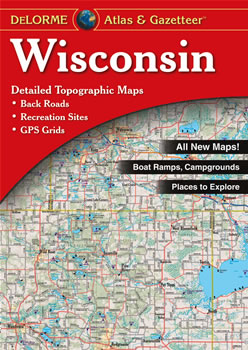Blue Highways: Kewaunee, Wisconsin
Unfolding the Map
 Kewaunee, on the shores of Lake Michigan, will technically be our last stop in Wisconsin with William Least Heat-Moon. Today I opine on taciturnity, privacy and reticence. In the United States, some regions might be more reserved than others, at least in their cultural norms. To see where silence is a virtue, quietly tiptoe over to the map, and don't disturb anyone!
Kewaunee, on the shores of Lake Michigan, will technically be our last stop in Wisconsin with William Least Heat-Moon. Today I opine on taciturnity, privacy and reticence. In the United States, some regions might be more reserved than others, at least in their cultural norms. To see where silence is a virtue, quietly tiptoe over to the map, and don't disturb anyone!
Book Quote
"Across the central North, conversations had been difficult to strike up. The people were polite but reserved; often they seemed afraid of appearing too inquisitive, while at other times they were simply too taciturn to exchange the banalities and clichés necessary to find a base for conversation.
"When I walked the North towns, people, wondering who the outsider was, would look at me; but as soon as I nodded they looked down, up, left, right, or turned around as if summoned by an invisible caller. 'Stranger,' Whitman says, 'if you passing meet me and desire to speak to me, why should you not speak to me?' I even tried my old stratagem of taking a picture of a blank wall just to give a passerby an excuse to stop and ask what I could possibly be photographing. Nothing breaks down suspicion about a stranger better than curiosity - except in the North; whatever works better there, I didn't discover. The effect on me was that I felt more alone than I ever had in the desert. I wished for the South where any topic is worth at least a brief exchange. And so I went across the central North, seeing many people, but not often learning where our lives crossed common ground."
Blue Highways: Part 7, Chapter 13
 Kewaunee Pierhead Lighthouse. This photo by JerichoHW is posted at the City-Data.com forum. Click on photo to go to host site.
Kewaunee Pierhead Lighthouse. This photo by JerichoHW is posted at the City-Data.com forum. Click on photo to go to host site.
Kewaunee, Wisconsin
I've touched on the taciturnity of the upper Midwest in previous posts at stops in Minnesota. However, since LHM brings it up again, it is worth looking at the reticence one may find in various places once again. LHM compares the North to the South, which he indicates is more outgoing. As one who has lived in both places, this has been my experience also.
I'll repeat my experience visiting Wisconsin after years of living in Texas and in Louisiana. In Texas, we got used to very nice, open and outspoken people who dressed in more vibrant colors and peppered their speech with the "isms" that Texas is known for. My wife and I were two of what is fast becoming an endangered species in Texas - liberals. We hung out with other liberals but also had occasion, either personally or through work, to rub elbows with those ideologically opposed to us. Regardless of any of that, Texans put a premium on being social and on conversation. People appeared, therefore, to be open to interaction with others.
In Louisiana, we had similar experiences. Of course, our experience of Louisiana was mostly New Orleans, where everyone just lets who they are hang right out there. If anything, that openness and willingness to interact culminates each year in the explosion of color and celebration known as Mardi Gras.
In those states, anything you brought up was a topic fit for conversation. How different, then, it was when we visited Wisconsin after a separation of a number of years. With our friends, it was like old times where all kinds of issues were on the table. But with people we didn't know, trying to make conversation on even non-political, safe topics like the Green Bay Packers was often met with one-word answers and awkward silences after.
I'm not saying that Wisconsinites are cold and rude. Far from it. The people I met and got to know intimately are generous and kind, and opened up once I got to know them. I believe that the reserve and reticence is cultural. I found the same type of reserve in Germany, which shares cultural roots with much of Wisconsin. The dynamic, I think, is that it is not seen as polite to be overly curious about someone else's business, especially if you do not know them. It is also not polite if someone inquires too deeply into your business. What is left is an unwillingness to engage in small talk and to allow strangers glimpses into one's private business. I also think that the harsh winters, so similar to those in northern Europe, separated and isolated people for a number of months. That isolation probably left people tight-lipped and quiet. This has filtered down as a cultural attribute. It leaves a person like LHM in a kind of limbo - how can one pierce the walls surrounding people? It's a Catch-22. The more he tries, the less success he has.
There are benefits to the reserved nature of many in the upper Midwest. Nobody knows your business, and by extension, your problems. That privacy can be very important and very protective. Unfortunately, my sense is that it can lead to isolation. Growing up in a small town in a dysfunctional family, I know the harm that isolation and a lack of openness can breed.
However, contrast this with the openness that you often find in the South. There is a lot to be said for it. Yet, one can be overwhelmed with that openness. Sometimes, that openness doesn't translate to a feeling that there is interest in what you have to say. Sometimes it might seem that boundaries can be stretched.
I realize that I'm painting regions with a broad brush. One finds very open people in the upper Midwest, just as one finds reticent and taciturn people in the South. As for me, as I get older I tend to err on the side of openness. I've had too much experience with the harm that can come from holding back, keeping secrets, and avoidance. I would rather maintain an open demeanor and show my curiosity about people and the world. Perhaps it might get me in trouble sometimes, but I feel that the rewards will outweigh any of the costs. I also just simply like how it feels to be more open and less reticent.
The ultimate test of one's ability to deal with openness and lack of privacy often comes in overpopulated sections of the developing world. In the late 1990s I traveled to Bangladesh, one of the most densely populated countries in the world, and any illusions of privacy were shattered. I was always in the midst of a crush of people, even in the rural areas. Everything I did, regardless of if I was eating in a roadside restaurant, taking a walk, looking in a shop window, or looking at a landmark, was of such intense interest to everyone else that if I stopped for a certain amount of time I attracted a crowd. At first it gave me an inflated sense of self-importance. By the time I left, however, I was aching for that sense of personal privacy to be restored. I often wonder, as populations grow around the world and global climate change makes some areas less easily inhabited, if more and more people will be forced to live closer and closer together and share resources. Is it possible that personal privacy will become a true luxury, one that is unavailable to most?
Musical Interlude
I'm not exactly pleased with my music selection for this post as I wanted to see if I could capture the "taciturn" North. But I couldn't find really anything that satisfied me. So what you're left with is a song by Ultravox called Quiet Men. It's a perfectly fine song, but doesn't set the mood I had in mind. Oh well...sigh...
If you want to know more about Kewaunee
City of Kewaunee
Green Bay Press Gazette - Kewaunee County (newspaper)
Kewaunee Chamber of Commerce
Wikipedia: Kewaunee
Wistravel.com: Kewaunee
Next up: Somewhere on Lake Michigan




 Friday, March 30, 2012 at 12:52PM
Friday, March 30, 2012 at 12:52PM





